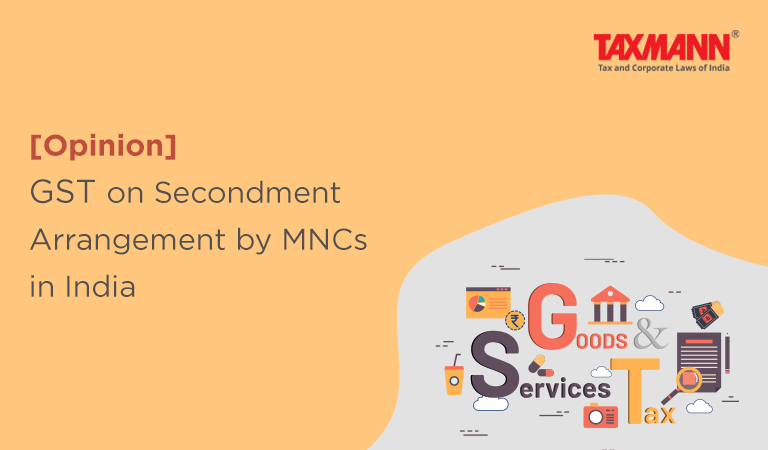[Opinion] GST on Secondment Arrangement by MNCs in India
- Blog|News|GST & Customs|
- 2 Min Read
- By Taxmann
- |
- Last Updated on 5 January, 2023

[2023] 146 taxmann.com 60 (Article)
Since 1991, India has experienced a dramatic in the presence of Multinational Companies (“MNCs”), and with it, tremendous expansion in the amount of foreign direct investment (FDI) inflows to the Indian economy. The effects of liberalization on India’s economy have been overwhelmingly positive and statistics confirm this. MNCs have been playing an important role in the economic growth and development of the country, leveraging on the improving ease of doing business and liberalised regulatory environment. The Government on its part has consistently focused on easing the policy and regulatory environment for MNCs in India. Recognizing the pivotal role played by the MNCs, it has eased and enhanced the scope for their participation in the Indian economy and continues to do so. Large number of MNCs have taken their business to the next level, positioning India both as a business hub serving global clients and as a base for exports thereby creating greater employment opportunities for the local nationals, sharing of international best practices and more importantly supporting the local community via CSR initiatives.
No person would like to establish its business operations in a country which has complex law(s). Ease of doing business is one of the primary factors that motivates a country to do business with other countries. The Indian Government has a vision of creating a vibrant, innovative entrepreneurship ecosystem in India. As part of the initiative, a flurry of reforms has been announced with the objective of ease of doing business in India.
In the case of MNCs it is usual practice for a foreign parent or group entity to depute or second its employees to the Indian subsidiary or group company for various reasons. The main reason that the subsidiary companies in India to carry on its own business in a more efficient and effective manner by using the expertise of deputed or seconded employees from their parent companies. They believe that there is an employer-employee relationship between company and seconded/deputed employees.
Most of the MNCs’ under impression that the services rendered by the deputed/seconded employee to its employer during the course of employment is not treated as supply and will not come under purview of GST. The terms ’employee’, ’employer’ is not defined under the GST law and hence, the same needs to be interpreted as understood generally. Where the foreign entity has seconded its employees in Indian entity wherein the expatriates qualify as employees of Indian entity, the transaction between the expatriate and Indian entity will not be treated as ‘supply’ and accordingly, GST will not be applicable on consideration paid by the Indian entity to the expatriates.
Click Here To Read The Full Article
Disclaimer: The content/information published on the website is only for general information of the user and shall not be construed as legal advice. While the Taxmann has exercised reasonable efforts to ensure the veracity of information/content published, Taxmann shall be under no liability in any manner whatsoever for incorrect information, if any.

Taxmann Publications has a dedicated in-house Research & Editorial Team. This team consists of a team of Chartered Accountants, Company Secretaries, and Lawyers. This team works under the guidance and supervision of editor-in-chief Mr Rakesh Bhargava.
The Research and Editorial Team is responsible for developing reliable and accurate content for the readers. The team follows the six-sigma approach to achieve the benchmark of zero error in its publications and research platforms. The team ensures that the following publication guidelines are thoroughly followed while developing the content:
- The statutory material is obtained only from the authorized and reliable sources
- All the latest developments in the judicial and legislative fields are covered
- Prepare the analytical write-ups on current, controversial, and important issues to help the readers to understand the concept and its implications
- Every content published by Taxmann is complete, accurate and lucid
- All evidence-based statements are supported with proper reference to Section, Circular No., Notification No. or citations
- The golden rules of grammar, style and consistency are thoroughly followed
- Font and size that’s easy to read and remain consistent across all imprint and digital publications are applied



 CA | CS | CMA
CA | CS | CMA
